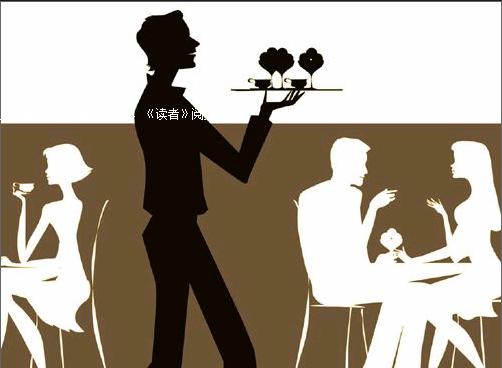Everyone Should Wait Tables 小小餐馆,百态人生
2014-12-24



When I was a teenager waiting tables in a series of Italian eateries of wavering quality, I would have leapt at1) the chance to replace myself with an iPad, as Applebees has recently rolled out2). The meals I served back then were generally not “cooked” so much as they were “poured from a slit in a bag and reheated,” and the only thing that made me sadder than people ordering the food was people liking it. That flashing electronic device at each table may sound disheartening, but its less depressing than an actual human pretending she likes working at Applebees.
But there is much to be learned in the service industry, and at 23, I finally got a job at a restaurant I adored and admired, a Madison, Wis., farm-to-table place named LEtoile that was trumpeting3) its local sourcing about 30 years before everyone else except Alice Waters4). Surely the guests at such a restaurant would be gracious, even blissful. Surely we would bond over the love of fine food that had brought us together. And with many guests, this was indeed the case. But the grander truth I take away from my decade in the restaurant business is this: We would all be better people if restaurant work were compulsory. We might at first be more ragey, baffled-by-our-peers people, yes, but I submit5) that as time went on and a wave of restaurant-educated people burst forth6), wed benefit.
Chopping away in the back of the house does not count for these purposes, by the way, difficult and demanding though that work is. In the kitchen, the worst you might do is grievously injure yourself. In the dining room, you face humanity.
And this is humanity at its most oblivious, tetchy7) and petulant8). Weve all heard about the snooty9), demanding restaurant guests, but snootiness was not generally a big problem in Madison. When the arena is a friendly college town in the Midwest, youre not really achieving much by getting your way10)—its Wisconsin! We were probably going to do that for you, anyway. The occasional celebrity strolled through, visiting a kid at UW or playing a concert, but they were invariably low-key and unobtrusive11). No, it was the regular folks who drained me of my will to stay in the restaurant business, and at times my will to breathe.
When I was still working for a restaurant that made pizza by unwrapping frozen dough-discs and running them through a glorified toaster, I expected little of my fellow humans. Were we not all there because wed agreed to settle? They wanted cheap food and I wanted a job staffed with my friends, where management was not too eagle-eyed about the wine spigots12). (Oh, yes: spigots.) But at an upscale, serious restaurant, the occasional rudeness and unalloyed13) weirdness of my customers seemed almost personal. This was my place, a place where I had saved my money to dine many times before I dared to try and work there, a place that introduced me to vaporous14) local cheeses, luscious15), dripping moonglow pears and crisp-skinned sweetbreads I can still recall tasting to this day.
And yet when people climbed the stairs and entered our dining room, many relinquished some crucial awareness along with their winter coats: of their bodies and others, of social norms, of the laws of time and space. Either we have taken this “customer is always right” approach way too far, or else we have absorbed it far too greedily. I too love the fantasy and the sheer theater of a good restaurant experience, but it can feel so divorced from daily life that people take it as the opportunity to enjoy a total meltdown of the social compact. Eye contact, replies to direct questions and protecting your progeny16) from obvious dangers all fall by the wayside17). A restaurant guest intent upon his own coddling is an alarming beast.
Parents set their babies free to crawl in the treacherous18) aisle where the servers carried great trays of dishes. People would plunder our expensive flower arrangements, drunkenly requesting “a rose for each of the ladies.” Some felt so freed from the drudgery19) of cooking and serving a meal that they forgot that humans with bodies were involved in the process of feeding them at all. These were the people who gestured madly and unexpectedly, flinging their elbows into a servers solar plexus20) and sloshing21) martinis off of our trays.
Oh, not all people were violent or hazardous. Some were simply odd. Diners occasionally rose from their tables to stand by the windows and gaze out at the starry winter night, sipping their wine and posing in the light from the adjacent22) capitol building, so that the servers could feel them feel us watching. I understood the impulse—weve all seen those movies in which closing down a restaurant is the height of romance, and in those scenes one never sees a server. But we were there, our backs to the dining room floor that now doubled23) as the living room in someones personal romance novel, rolling our eyes.
The funny thing is, during my years of working in a restaurant that demanded a great deal of its employees, not least24) of which was graciousness in the face of rudeness, I loved my job. I loved immersing myself in the world of food, learning about wine, quizzing the cooks on technique, introducing people to ground cherries or foie gras25). It was not an easy job to obtain and I was proud to be there. But the cumulative effect of, well, people, eventually took its toll26).
Here is where I find myself turning an about-face27) of sorts. I have long thought everyone should have to wait tables, but for years my goal was collective comeuppance28) or just to scare them straight. Now, the more I consider the effect of my own experience, the more I become the consumer instead of the provider, the more I realize what unsettles me still about restaurant life isnt the bad behavior. It is the moments when the empathy is too unavoidable and too painful, when guests arrived hoping to enjoy the public intimacy of the dining room and ended up regretting it: the proposals that were not accepted, or the girl who got up to visit the restroom before the main course arrived, leaving her date and the servers to slowly realize she wasnt returning.
A required year on the front lines would not just be a refresher in simple good manners, but the reminder of the underlying purpose of those manners: Even in a privileged dining room, this is a crowded, uneasy world, and being considerate of each other at the moments our lives unavoidably intersect can smooth the rough edges just a little bit. A former server is more likely to treat wait staff as sentient29) beings, yes, but Id like to think we also retain some measure of empathy, much as we try to squelch30) it. A lot of lives came into my orbit when I was a server, drawing me in at moments that were joyous, sorrowful, nerve-wracking and all the more delightful or harrowing31) for occurring so publicly. You cant live in your own hermetic32) world if youre a server; you cant avoid learning about the lives of others, not when those others arrive in your life each and every night, bringing with them a bundle of hopes and worries and celebrations and rifts33).
I still think of that girl who ditched her date and wonder what spurred her to do it. They seemed uncomfortable at the restaurant, too young and uncertain to enjoy it, perhaps. She had long blonde hair, bangs, and wore a black dress with flowers on it. He had on a beige34) shirt, brown tie, and parted hair. Im sure neither remembers me and that both hope I dont remember them. But I do. I remember trying to be brisk35) and unobtrusive when I cleared her untouched plate—is it possible I wrapped it up for him to take home? I only recall that it was hard to bear, the machinations36) we all had to work through, complicit37) in pretending this was not humiliating—the table-clearing, the pointless but obligatory offer of coffee or dessert, the bill, the signing—before I could step back and release him, both of us hoping wed never see one another again.
我十多岁时,曾先后在几家饭菜质量时好时坏的意大利小餐馆当过服务员。如果那时能有机会让iPad来代替我工作——就像苹果蜂餐厅最近推出的服务那样——我一定会求之不得。那时,我端上桌的大部分食物与其说经过了“烹调”,倒不如说是“从包装袋里倒出来重新加热了一下”。比起有人点餐,更让我感到沮丧的只有一件事,那就是人们居然喜欢那些食物。每张餐桌上放着那台亮闪闪的电子设备,这听上去也许让人心里不是滋味,但是比起让一个活生生的人装作喜欢在苹果蜂餐厅工作,那也不算太令人沮丧。
不过,从事服务业可以让人学到很多东西。23岁时,我终于在一家自己心仪和崇拜的餐厅得到了一份工作。这家名为“星斗”的餐厅位于威斯康星州麦迪逊市,奉行“从农田到餐桌”的理念,在宣扬采购本地食材这一点上比所有人超前了大约30年——艾丽丝·沃特斯除外。光顾这种餐厅的顾客必定是温文有礼甚至是极为愉快的。由于对美食的共同爱好而相遇的我们也必定能建立良好的关系。就许多顾客而言,情况确实如此。但是在餐饮这一行工作了十年之后,我收获了一条更为颠扑不破的真理:如果在餐厅工作是人人的必修课,那我们都将成为更好的人。开始时,我们也许会更易动怒,更多地感受到别人带来的挫折感,的确如此。但我认为随着时间的推移,当经过餐馆工作历练的人大量涌现时,我们将从中受益。
顺便说一句,在后厨切菜无法达到这些效果,尽管后厨工作难度高,强度也大。厨房里所能发生的最糟糕的事就是皮肉上受点重伤;而在餐厅里,你面对的是人性。
你所面对的是人性中最无视他人、也最暴躁和任性的一面。大家都听说过那种傲慢无礼又挑剔的食客,但是在麦迪逊,傲慢无礼通常不是什么大问题。因为在中西部这座气氛友好的大学城里,任性而为并没有太大的意义——这里是威斯康星!我们终究可能还是会让你心随所愿的。偶尔会有名人漫步走过,去威斯康星大学探望子女或来此地举办音乐会,但他们无一例外地行事低调、毫不招摇。不,使我逐渐失去继续在餐饮业工作的意愿,有时甚至让我觉得连生活都失去意义的,是那些普通人。
拆开速冻饼坯的包装,把饼坯放进华丽的烤箱里加热就能制作出比萨——当我还在这样一家餐厅工作时,我对别人也没有什么要求。我们不都是因为愿意将就才去那儿的吗?他们想要廉价的食物,而我想要一份能跟朋友们共事且店方对酒桶的阀门(哦,是的,阀门)看管又不是很严的工作。但在一家正经的高档餐厅里,顾客偶尔表现出的粗鲁和极为怪异的行为几乎就像是针对你本人一样。这是我的地盘,是我攒钱来这里多次用餐之后才鼓起勇气试着来工作的地方,我在这里初次品尝了入口即化的本地奶酪、甘美多汁的“月光梨”和外皮酥脆的动物胰脏,它们的味道令我至今记忆犹新。
然而,在走上台阶、步入餐厅之后,很多人就把一些十分重要的意识连同他们冬天的外套一并放到了一旁:包括他们对自己和他人身体的意识、对社会规范的意识,以及对时间和空间规律的意识。也许是我们过于按照“顾客永远是对的”这句话行事,或是我们过于信奉这句话。我也喜欢一次好的就餐体验带给人的那种梦幻般的、充满戏剧性的感觉,但是如果把去餐馆用餐当做一次从社会契约中彻底解放的机会,那感觉就太脱离日常现实了。保持目光接触,回答直接的问题,保护自己的孩子使他们远离显而易见的危险,所有这些全都被抛诸脑后。一个只想着娇纵自己的餐厅顾客实在令人生厌。
服务员端着盛满餐盘的托盘在过道中走,家长们却不顾潜在的危险,放任年幼的孩子在过道上爬来爬去。有些客人会随意摘取店内昂贵的插花装饰,醉醺醺地要求“送每位女士一枝玫瑰”。有些人在卸下煮饭烧菜、端盘递碗的苦差后感到如此轻松自在,以至于全然忘记了还有一些血肉之躯在为他们提供食物。这些人做着夸张和出其不意的手势,他们的手肘会猛然挥到服务员的心口上,把托盘中的马提尼酒也撞得泼洒出来。
哦,并非所有人都举止粗鲁、有危害他人之虞。有些人就是怪怪的。偶尔会有客人从餐桌旁起身,站在窗边凝望冬夜的星空,一边啜饮杯中的美酒,一边借着旁边议会大厦的灯光摆造型,好让服务员都能察觉到他正在感受着我们的目光。我可以理解这种冲动——我们都在电影里见过这样的场景,当餐厅打烊时,浪漫的气氛也随之达到顶点。在那些场景中,人们从来看不到服务员的身影。但是我们在场,当某人在内心的浪漫戏中将这家餐厅幻化成自家的客厅时,我们正背对着餐厅不屑地翻白眼。
奇怪的是,在一家对员工要求极为严格——特别是要求服务员在面对顾客的无礼时仍要彬彬有礼——的餐厅工作的那些年里,我始终热爱我的工作。我喜欢沉浸在美食的天地中,学习酒类知识,向厨师询问烹饪技巧,为顾客推荐酸浆果或肥鹅肝。这份工作来之不易,我为在那里工作感到自豪。可是,和人打交道的累积效应最终还是产生了恶果。
正是在这时,我发现自己的想法发生了差不多是彻底的逆转。我一直认为应该要求每个人都当一当服务员,但多年来,我这样想的目的是让所有那些人受到应有的惩罚,或是仅仅给他们一个下马威。如今,当我更深入地思考我的经历带来的影响,更多地以消费者而非服务者的身份来考虑问题时,我更加清晰地意识到,我在餐厅工作的经历之所以至今仍然让我难以平静,并不是因为顾客的不当行为,而是因为当客人来到店里,希望能够在餐厅里公开享受一段亲密的时光,最后却以懊悔收场的那些时刻,那种如同己受的感觉太不可避免,也太让人痛苦:求婚未被接受,或是女方未等主菜上桌就起身去洗手间,她的约会对象和服务员在等了很久之后才意识到她不会回来了。
在餐厅一线强制工作一年不仅可以让我们学习那些基本的礼貌,还能提醒我们礼貌待人的根本目的是什么:即使在高级餐厅,这里依然是拥挤、纷扰的环境,在我们的人生不可避免地相互交会之际,互相体谅可以让彼此的棱角稍稍变得不那么尖锐。做过服务员的人更有可能把服务员当做有感知能力的人来对待,这一点不假。不过我倾向于认为,我们还保留了一定程度的同理心,尽管我们想设法压制这种感觉。做服务员时,有许多人走进我的世界,让我参与了许多或快乐、或忧伤、或伤神的时刻。当这一切都发生在公共场所时,那种快乐或痛苦的感觉也会格外强烈。作为一名服务员,你不可能只活在自己那与世隔绝的小天地里,你会不可避免地了解别人的生活。当那些人在每个晚上带着各自的希望、忧虑、庆祝或争执进入你的生活,这种了解是免不了的。
我仍然会想起那个丢弃约会对象的女孩,想知道是什么促使她那样做。他们在餐厅里似乎并不自在,也许是因为太年轻、心里太没底,所以无法享受餐厅的环境。女孩留着金色长发,梳刘海,身穿一袭印花黑裙。男孩穿一件浅棕色衬衫,打棕色领带,留分头。他们肯定都不记得我了,并且肯定希望我也不记得他们。可是我记得。我记得自己尽量干脆利落、悄无声息地收拾女孩留下的原封未动的餐盘——有没有可能我把菜打包让他带走?我只记得当时的场面让人难以承受,我和他不得不完成一场“密谋”,心照不宣地假装这不是什么不光彩的事:收拾餐桌,虽毫无意义却还是照例询问他要不要咖啡或甜点,开账单,签名付款。之后我就可以走开了,留下他一个人。我们都希望永远不要再见到对方。
1. leap at:赶紧抓住(机会);迫不及待地接受
2. roll out:推出(新产品或服务)
3. trumpet [?tr?mp?t] vt. 宣扬,鼓吹
4. Alice Waters:艾丽斯·沃特斯(1944~),美国厨师,著名有机餐厅Chez Panisse的创办人,是有机食品的积极支持者。
5. submit [s?b?m?t] vt. [律]认为
6. burst forth:忽然发生,突然出现
7. tetchy [?tet?i] adj. 暴躁的,易怒的
8. petulant [?petj?l?nt] adj. 任性的,脾气坏的
9. snooty [?snu?ti] adj. 傲慢自大的
10. get ones way:想怎样就怎样,随心所欲
11. unobtrusive [??n?b?tru?s?v] adj. 不引人注目的
12. spigot [?sp?ɡ?t] n. 龙头,阀门
13. unalloyed [??n??l??d] adj. 纯粹的
14. vaporous [?ve?p?r?s] adj. 蒸气状的
15. luscious [?l???s] adj. 美味多汁的
16. progeny [?pr?d??ni] n. 子女,后裔
17. fall by the wayside:半途而废
18. treacherous [?tret??r?s] adj. 暗藏危险的
19. drudgery [?dr?d??ri] n. 苦差事;单调乏味的工作
20. solar plexux:〈口〉心口,腹部心窝处
21. slosh [sl??] vt. 使泼溅出
22. adjacent [??d?e?s(?)nt] adj. 邻近的,毗邻的
23. double [?d?b(?)l] vi. 兼做,兼任
24. not least:尤其,特别
25. foie gras:〈法〉肥鹅(或鸭)肝
26. take its toll:造成损失(或危害、伤亡等)
27. about-face:(立场、观点等)彻底改变
28. comeuppance [k?m??p?ns] n. 〈美口〉报应,应得的惩罚
29. sentient [?sen?(?)nt] adj. 有感知能力的
30. squelch [skwelt?] vt. 压制,打消
31. harrowing [?h?r????] adj. 令人痛苦的;折磨人的
32. hermetic [h??(r)?met?k] adj. 封闭的;与世隔绝的
33. rift [r?ft] n. 不和,失睦
34. beige [be??] adj. 淡棕色的
35. brisk [br?sk] adj. 干脆利索的
36. machination [?m?k??ne??(?)n] n. [常作~s]阴谋诡计;密谋
37. complicit [k?m?pl?s?t] adj. 同谋的,串通的
